Political gameplay promises to get uglier in countdown to Brisbane Olympics
Shifting agendas and inconsistent decisions plague preparations for Brisbane Olympics 2032.
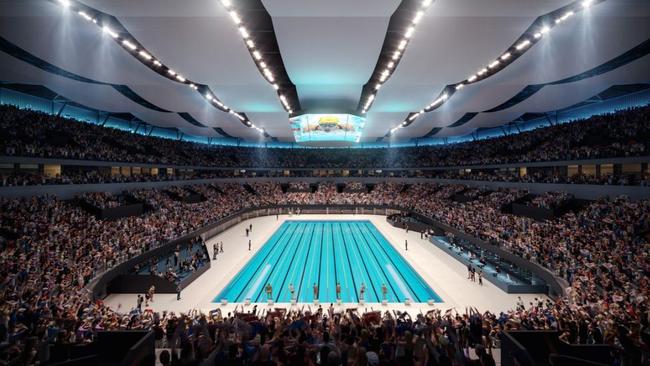
The International Olympic Committee’s New Norm reforms will be locked down by the time the flame passes in 2032 to Brisbane, the smallest city in nearly four decades to be awarded the planet’s biggest combined-sports tournament. This was always going to be a formidable ask.
Consider the roster of megacities since Sydney 2000: Beijing, London, Rio de Janeiro, Tokyo, Paris in the coming days and Los Angeles in 2028. The idea is to make the Games a realistic proposition for mid-sized bidders, avoiding the financial millstones that mired Munich and Montreal in the 1970s and the ruinous legacies of crumbling purpose-built Olympic venues for Athens (2004) and Rio post-2016.
The need for careful, systematic and early planning was recognised as the prerequisite for Brisbane to grasp the generational opportunity presented by Australia’s third Olympics and second Paralympics.
The 11-year runway rolled out by the IOC reflected this thinking and was a key advantage given to the Brisbane 2032 organisers.
But here we are, marking the third anniversary this weekend of the Games being won, with the preparations bedevilled by shifting political agendas and inconsistent government decision-making.
A tortuous back-to-the-future call on the Olympic stadium has become exhibit A for all that has gone wrong, and could still be unwound if the opinion polls are borne out and Steven Miles’s third-term Labor outfit is shown the door at the state election on October 26.
YouGov research published this week by The Courier-Mail put the Liberal National Party fully 14 points clear, 57-43 per cent on the two-party vote, on track for a commanding victory. LNP leader David Crisafulli continued to head Miles as preferred premier, 40-29 per cent.
A privately voiced suspicion in Brisbane business circles is that the bureaucrats in George St are slow-walking scoping to upgrade the vintage 1982 Commonwealth Games athletics venue at suburban Nathan – the Premier’s pick after he rejected the recommendation of an independent review panel to build a new $3.4bn stadium on the northern fringe of the CBD in favour of the Queensland Sport and Athletics Centre option floated by IOC powerbroker John Coates – in expectation of a change of government. This is rejected by State Development and Infrastructure Minister Grace Grace.
But confusion and scepticism abound, feeding into waning public support for the Olympics. In May YouGov found that 59 per cent of Queensland voters professed to be “not that excited” by them, up nine points since 2022. The number of those who were very excited or fairly excited slipped.
The independent infrastructure agency axed by Miles’s predecessor, Annastacia Palaszczuk, and reinstated when he took over last December, has yet to become operational. If the LNP prevails at the general election, Crisafulli will commission a fresh evaluation of the projects, potentially sending the process back to square one.
He has accused Labor of squandering the additional 1000 days it had to plan.
Grace maintains that all Olympics have “teething problems”, and Brisbane 2032 is no exception. The government’s priority had been to set a strong platform for the detailed planning and delivery work to come.
Unsurprisingly, she describes the progress to date as “amazing” and “remarkable”. “With any major event, with any major project you need to get the foundations right,” she tells Inquirer. “And … often you don’t see the building coming out of the ground until after a while. We’re now at the stage where the buildings are starting to come out of the ground and I think we’re in a very positive position.”
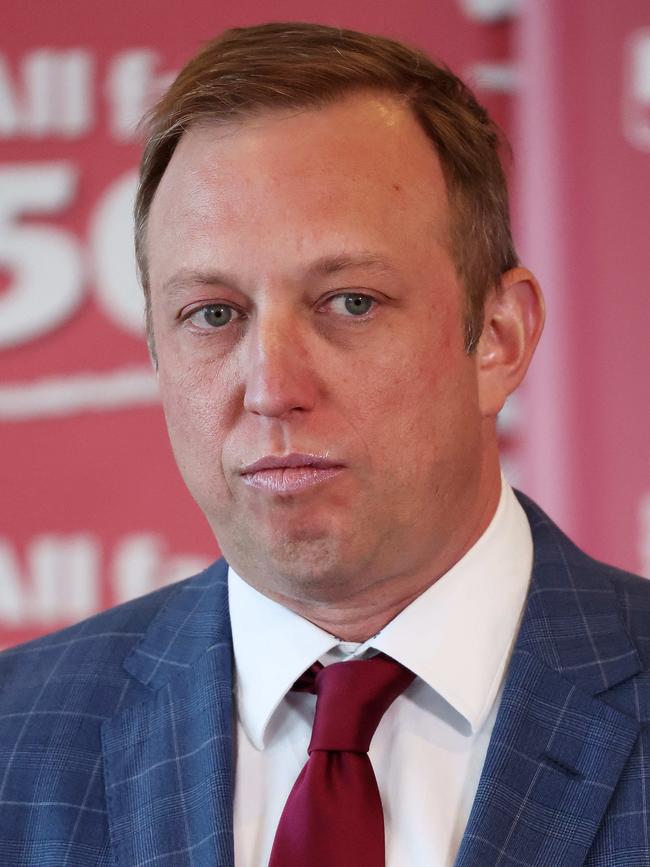
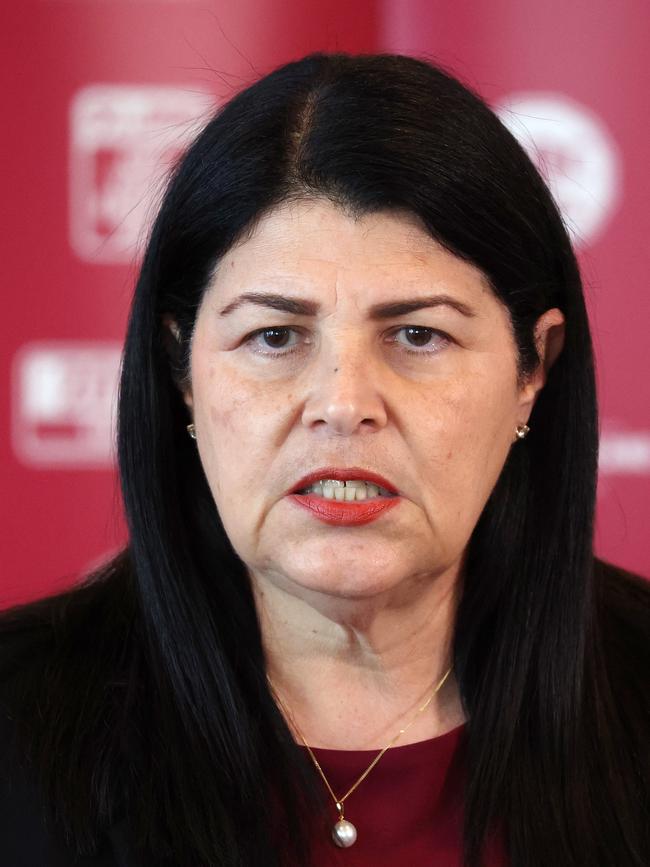
Crisafulli declined to be interviewed, as did Miles. LNP deputy leader Jarrod Bleijie said in response to written questions: “Under Labor the Games are at a complete standstill, while Labor is attempting to look busy. For at least three years before the bid, investigations were under way for the Games … but since the bid was won three years ago not a single shovel has hit the ground, not a single project has been progressed.”
So let’s take stock. Andrew Liveris, the Darwin-born, Brisbane-educated former boss of US industrial giant Dow Chemical who is president of the Games’ organising committee, OCOG, says it’s early days in the preparation process. The agency’s full-time staff has just hit 30, the kernel of a workforce expected to number in the thousands by the end of the decade.
In Liveris’s “done bucket” is the preliminary work on Games optimisation, pre-marketing, procurement, community engagement and the bedding down of communication lines with the IOC. He says foundational planning will be completed in the next six to 12 months, along with a draft sports program. Development of the sustainability strategy and artificial intelligence framework – a priority of the IOC, building on the likely deployment of virtual reality technology for viewers of the action in Los Angeles – is in hand.
On the overall state of play, Liveris says: “We are well within the bounds of our schedule now. We caught up on that first year when there wasn’t an OCOG … and we’ve got incredible relations with the IOC, the AOC (Australian Olympic Committee) and the Games delivery partners, and that’s all about getting common understanding of the things that matter
and, course, many of them are to do with infrastructure and venues.”
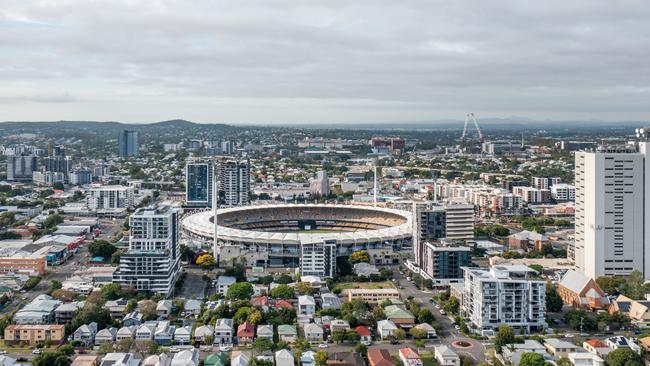
A shrewd political operator who dealt with US presidents reaching back to George HW Bush, Liveris doesn’t see the Olympics as a “make or break” issue at the state election in comparison with the cost of living, housing affordability, health or the hot-button problem of youth crime in Queensland. But there’s a sting in his message to the politicians, all of them.
“What I’ve been telling everyone, whoever’s in power, is that, hey, let’s have recognition this is an amazing thing to have won,” Liveris says.
“Second, let’s talk about it in the context of where it is in the process and let’s not get ahead of ourselves. Let’s not make promises that, you know, we frankly haven’t done the work on. Let’s do the work.”
Liveris won’t be drawn on whether he has the Olympic stadium debacle in mind, though it’s easy to read between the lines. The Gabba factor dominated from the outset. Brisbane formally got the nod from the IOC on July 21, 2021, after Palaszczuk made the ageing inner-city ground the centrepiece of the state government-led pitch for the Games. (Already the designated preferred candidate, the regionalised bid at that point was entirely Brisbane’s to lose.)
The planned upgrade was from the ground up, a start-over job. The stands would be knocked down and replaced at a cost of $1bn, kickstarting an urban renewal drive. The new stadium was to be the jewel of a revitalised inner-city precinct, burnishing the legacy dividend from the Games.
Palaszczuk then tried to wedge the Liberal prime minister, Scott Morrison, into picking up half the tab for the rebuild, warning the bid would fall over if Canberra didn’t stump up. Morrison instead upped the ante. He pledged to split the cost of hosting the Games in their entirety with Queensland 50-50, provided the federal government had a commensurate say in how the money was spent.
By the time the deal was sealed, the projected Gabba upgrade had blown out to $2.7bn and the other major venue, Brisbane Arena, an 18,000-seat hall to be constructed on an elevated deck over bustling Roma Street railway station, was budgeted at $2.5bn. The Olympic swimming would be staged there in a drop-in pool.
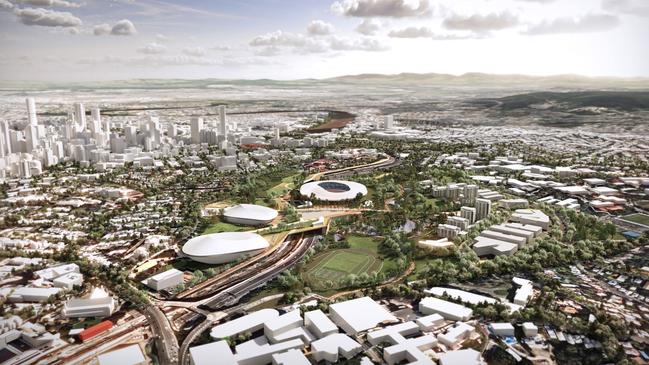
Palaszczuk’s credibility, in tatters over the rubbery Gabba costings, took a further hit when Queensland Auditor-General Brendan Worrall told a parliamentary committee in March last year that the original $1bn price tag had not been supported by a business case. “I think you’ll find the source of that was from a press release,” he said.
Anthony Albanese, now Prime Minister, wanted nothing to do with the Gabba. Under a revised package worth $7.1bn, the commonwealth would cover the tricky arena build, its contribution capped at $2.5bn, while the stadium was to be a wholly state project. The balance of the funding went to second-tier venues, with each side kicking in a half share.
Which brings us to the review panel Miles set up under former Brisbane mayor Graham Quirk. Coates declared the Gabba rebuild was a non-starter ahead of the release of Quirk’s findings in March, and proposed that the Olympic track and field competition go to QSAC. The opening and closing ceremonies would be held on the rectangular pitch of the 52,000-seat Suncorp Stadium, renowned as the world’s best rugby league ground.
It’s fair to say that Brisbane has something of a love-hate relationship with the former QE2 stadium deep on the city’s southside: people might have flocked to it during the Commonwealth Games 40 years ago, but the absence of a direct train service was an issue even then. When the Brisbane Broncos played at QSAC from 1993 to 2003, game attendance plunged.
Quirk backed the construction of a new, $3.4bn Olympic stadium in the inner-north pocket of Victoria Park to seat up to 55,000 people, arguing that the $1.4bn-plus cost of upgrading QSAC did not “demonstrate value for money and is very hard to justify”.
Brisbane Arena, priced north of an eye-watering $4bn by Quirk, would relocate to a more economic site in the public gardens adjoining Roma St station. The LNP man agreed with Coates that the Gabba rebuild should be scrapped: taking in the displacement costs for the AFL and cricket, the cost to taxpayers would top $3.3bn. A partial refurbishment, worth up to $2bn, would not address the limitations of the constrained stadium footprint, bordered on four sides by busy roads.
Either way, up to $1bn would have to be spent to bring the ground up to code if it was to continue to accommodate the Brisbane Lions during the football season, international cricket fixtures and the Big Bash League in the summer. Quirk recommended that it be bulldozed and converted to green space after Victoria Park came on line, offsetting the loss of parkland to the new stadium.
As Crisafulli says, it’s a mess. The question is, what would he do to clean it up if he gets the chance? For now, the Opposition Leader isn’t biting, beyond maintaining a unity ticket with Miles against Victoria Park. The Premier says the outlay can’t be justified; Crisafulli insists it isn’t what the state signed up for three years ago.
In office, he would commission the new Games delivery agency to conduct a 100-day review into the major projects and be guided by the findings. Grace says the board and chair are in the process of being appointed by a neutral selection panel and dismisses the need to consult the opposition, even though Crisafulli has expressed reservations about a potential Labor stack.
Were an LNP government to move on from QSAC, the options seem limited. Crisafulli as premier could always return to the Gabba, sprucing it up with the budget renovation that failed to pass muster with Quirk on the basis that money needed to be spent anyway to keep the ground operational. But that leaves the practical issues encumbering the site.
The pitch and existing stadium are basically circular, and fitting in an oval 400m running track, with a 110m straight for sprints and hurdles, is deeply problematic. It would involve the swap-out of at least one stand for a pricey replacement build or reduction in seating. While the nominal capacity is 42,000, the space devoted to corporate hospitality, scoreboards and sight screening for batters means a full house is 33,000 for cricket and 37,000 for AFL.
Palaszczuk and Miles couldn’t sell the Queensland public on a rebuild adding 8000 seats; how would a new government go spending up on a redevelopment that potentially slashed the ground’s capacity? What would its anchor tenants, the sports codes, say?
Another option could be to shift the athletics to Carrara stadium on the Gold Coast. Quirk found it could be upgraded from 27,500 seats to a temporary capacity of 40,000 for $461m, a handy saving on QSAC. The ground, home to AFL side the Gold Coast Suns, is served by heavy rail from the state capital and the glitter strip’s expanding tram system. But aren’t these the Brisbane Olympics, albeit with a regional footprint? Quirk reported that 2250 beds would have to be pulled out of the main athletes’ village, which was “unlikely to be feasible”. The cost was unknown.
The former mayor is adamant Victoria Park could be revived after the state election, telling Inquirer: “I don’t think that anything is particularly dead at this stage … it’s all going to come down to government rule at the end of the day. I think it’s pretty clear that there is a public view that Victoria Park should go ahead.
“But it is a matter for government to determine ultimately.”
Grace says Labor is not for turning and will soon put the QSAC upgrade to market for feedback from potential bidders. The political gameplay promises to get uglier in the countdown to October 26. Grace claims Crisafulli is warming up for a post-poll backflip on the stadium, and will back Victoria Park if the LNP returns to power. Asked for the evidence, she says: “We’ve heard reports that they’re having conversations with developers … I think they’ve got a secret plan, yes.”
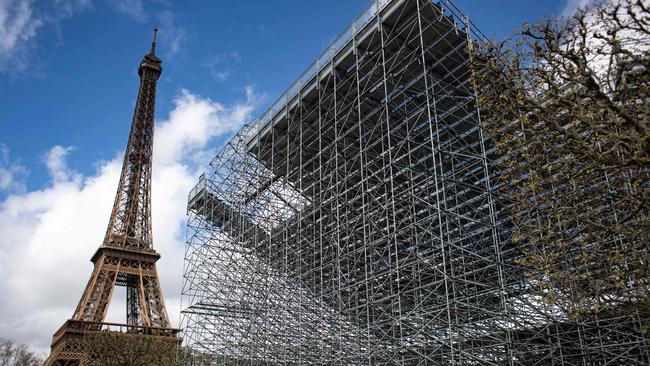
Bleijie, the LNP’s Olympics infrastructure spokesman, responds with the derision Grace’s remarks probably deserve. “This is more Labor mischief,” he says. “Grace is well aware we have ruled out a new stadium.”
But what if there was another way to seize the prize – maybe in Victoria Park, maybe not – at a cost more palatable to the taxpayer? Astonishingly, private investment has never been in the picture, even though the nation’s most up-to-date stadium, the impressive $1.6bn Optus edifice in Perth, was built as a public-private partnership, an arrangement also on the cards for the new AFL stadium in Hobart.
As we report in the news pages, two cashed-up private capital concerns, Plenary and Tetris Capital, have expressed interest in the Brisbane Olympics build. Plenary, a global developer of public infrastructure, has teamed with multinational entertainment promoters Live Nation and US-based project financier Oak View Group to run the ruler over Brisbane Arena and would target other projects if the long-term management rights were part of the deal.
Tetris principal Ryan Slocombe says: “We’d have interest in partnering with Queensland for the delivery of Games’ assets, and would look to participate through a PPP or similar option. Similarly with the stadium in Tasmania.”
Grace is prepared to consider what they have to offer, though she won’t be picking up the phone.
“If they want to come forward and put a proposal forward as part of where we want to go with the Gabba, I invite them and I welcome them,” she says. But private investment had been considered by the OCOG board, on which she sits, and “the numbers don’t stack up”.
She exudes a breezy confidence belying Labor’s unconvincing stewardship of the 2032 Games to date, arguing that Brisbane retains the “luxury of time” and the firing of the starter’s gun in
Paris next week will lift spirits, demonstrating “just how exciting it is to be the host city”.
“Can you imagine what it would be like if we won the Games now and we still had to do all this work … to get into our amazing position,” Grace says.
As it happens, Bruce Baird can. He was minister in the NSW Coalition government for the 2000 Olympics bid leading up to that stirring moment when Sydney was awarded the Games, seven years out. As Baird notes, that’s a year less than what’s left on the clock for the Queensland capital.
Yet by then, September 1993, most of the venue sites across Sydney had been selected and planned, with work under way in the Olympic precinct at Homebush on Stadium Australia and the aquatic centre. Construction of the underground rail link between the CBD and Sydney airport was only months away from starting.
“Everything was kind of tied down,” he remembers. “We knew pretty much what we were going to do, where and when things needed to be built and what it would cost.”
He’s a Liberal Party elder, the father of NSW’s 44th premier in Mike Baird, and doesn’t want to come across as partisan because he thinks the Games will be terrific for Brisbane, as they were for his hometown. Baird also deals with Miles as chairman of the Tourism and Transport Forum and gets on with the Queenslander.
But facts are facts. “I am a little bit disappointed that they haven’t gone all out for the top of the range stadium,” he says. “I understand the cost constraints, but we’re talking about the Olympics … a one-off opportunity to show your city to the world. You want to make the most of it.”


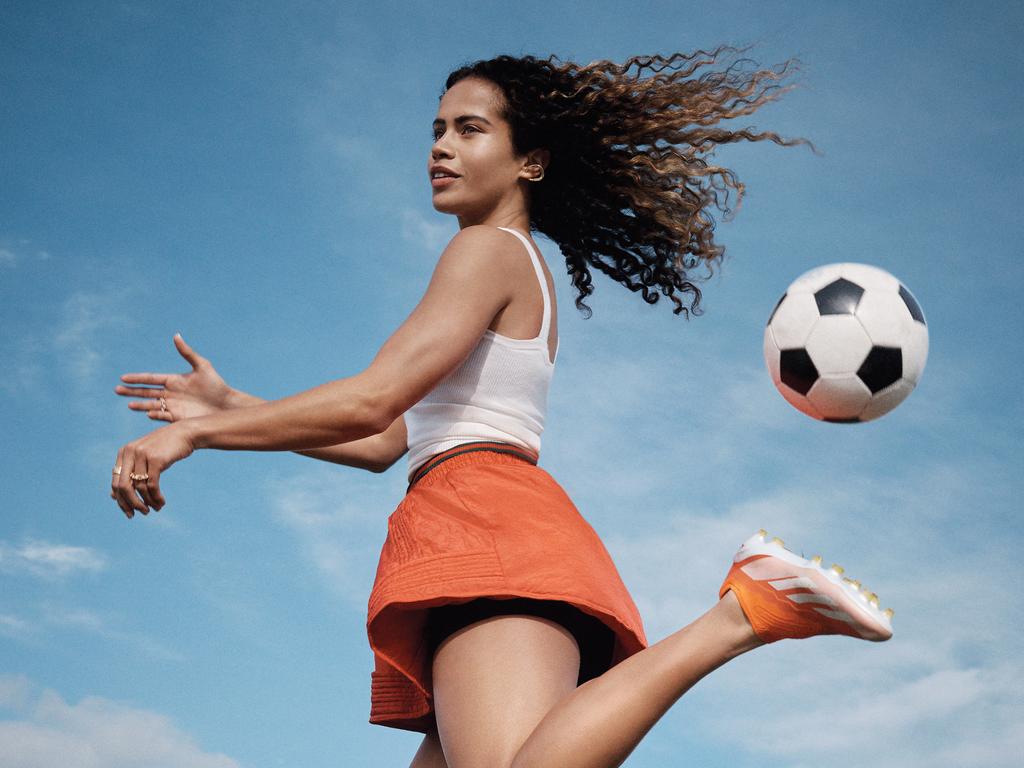
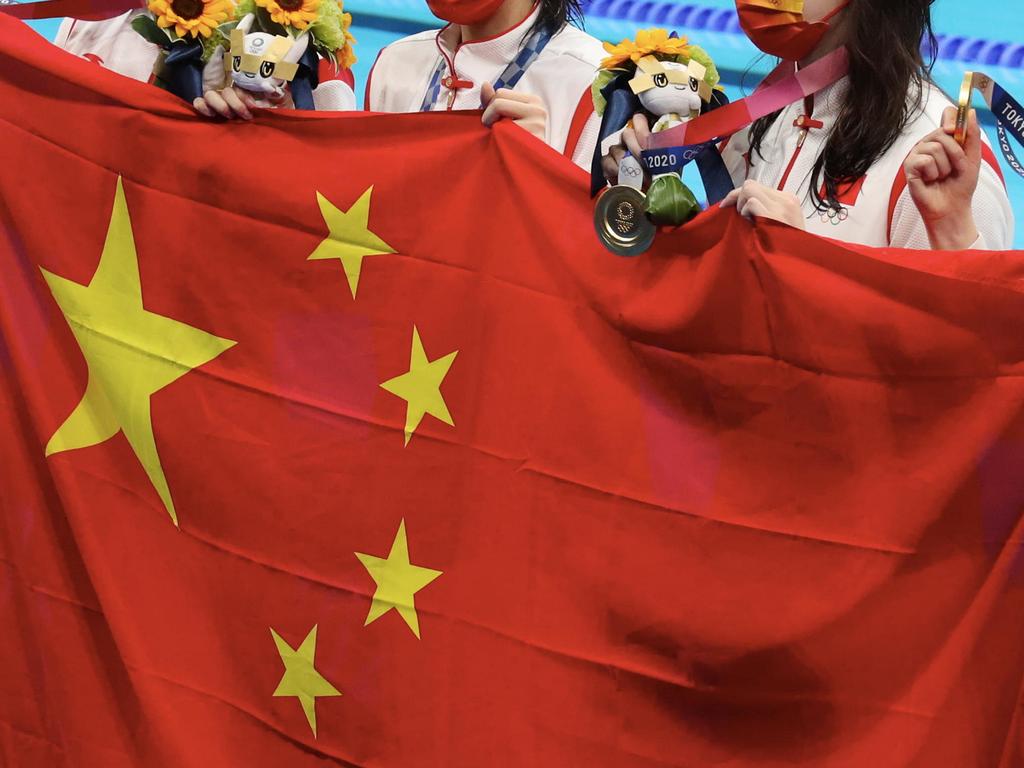



We’re about to see how a new era of the Olympics actually plays. Paris is the proving ground of a raft of innovations – recycled venues, slashed emission budgets, AI-enabled judging – that are supposed to turn the Games into something more than a two-week sugar hit, delivering affordable and lasting benefits to the host community and beyond.